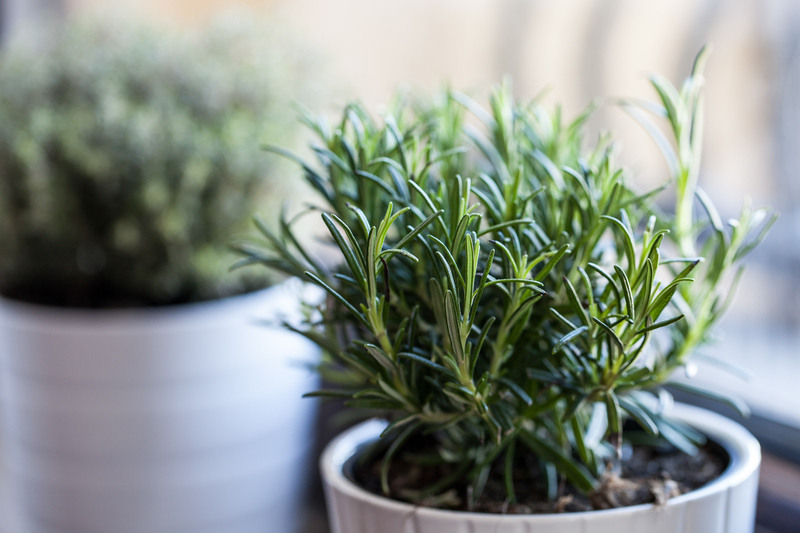Harnessing Nature's Power to Preserve Your Garden
Posted on 08/06/2025
Harnessing Nature's Power to Preserve Your Garden: An Eco-Friendly Approach
Gardening is not just about planting flowers and vegetables--it's about nurturing a living ecosystem. In this comprehensive guide, we'll explore how harnessing nature's power can help you preserve your garden, reduce maintenance, and cultivate a thriving, resilient landscape. Whether you're a seasoned gardener or a green-thumbed newbie, these nature-based techniques will empower you to protect your garden in harmony with the environment.
Why Preserve Your Garden Through Natural Methods?
The benefits of using nature-inspired techniques go far beyond a beautiful yard. When you harness the power of nature to preserve your garden:
- You minimize the use of synthetic chemicals--keeping your family, pets, and local wildlife safe.
- You create a self-sustaining landscape that withstands pests, disease, and extreme weather more effectively.
- You support biodiversity by fostering habitats for pollinators, birds, and beneficial insects.
- You help the environment by reducing chemical runoff and supporting healthy soil.
Let's dive into practical, science-backed strategies for preserving your garden the natural way.

1. Building Healthy Soil: The Foundation of a Thriving Garden
Composting: Turning Waste into Garden Gold
Compost is packed with nutrients and beneficial microbes, which are essential for robust plant growth. To harness nature's power for your garden, start by creating a compost pile or bin. Use kitchen scraps, yard waste, and leaves--but avoid meat, dairy, and oily foods.
- Mix green materials (fruit/veggie scraps, grass clippings) with brown materials (leaves, straw, paper).
- Keep your pile moist and turn it every couple of weeks.
- Within months, you'll have rich, dark compost to feed your soil and boost plants' natural defenses.
Mulching: Nature's Protective Blanket
Mulch is an underrated hero when it comes to preserving your garden using natural methods. Organic mulches--like bark chips, shredded leaves, and straw--naturally suppress weeds, conserve water, and regulate soil temperature. Over time, mulch breaks down, enriching soil health.
Tip: Apply a 2-3 inch layer around plants, avoiding direct contact with stems to prevent rot.
2. Managing Pests and Diseases the Natural Way
Encouraging Natural Predators
Instead of reaching for pesticides, invite nature's own pest controllers into your yard. Birds, frogs, ladybugs, lacewings, and predatory wasps all help keep pests in balance. How to attract them?
- Plant a variety of flowers--umbellifers like dill, fennel, and yarrows attract beneficial insects.
- Provide water sources such as shallow birdbaths or small ponds.
- Leave some undisturbed patches (log piles, shrubs) for shelter.
Companion Planting: Nature's Pest-Repellent Strategy
Preserving your garden naturally can be as simple as choosing the right plant neighbors. For centuries, gardeners have known that some plants offer mutual benefits:
- Basil deters tomato hornworms when planted near tomatoes.
- Marigolds repel nematodes and aphids.
- Nasturtiums lure aphids away from more valuable crops as a "trap crop."
Disease-Resistant Varieties
Choose plant varieties bred naturally for their resilience against common diseases. Read plant labels or seed catalogs closely for terms like "disease-tolerant," and aim for local heirlooms adapted to your region's climate.
3. Water Wisely: Sustainable Irrigation for Healthier Gardens
Rainwater Harvesting
One of the most eco-friendly ways to harness nature's energy for garden preservation is rainwater harvesting. Install a barrel at your downspout to catch roof runoff, then use the water for your garden during dry spells. Rainwater delivers minerals and is gentler on plants than treated tap water.
Drip Irrigation & Soaker Hoses
Reduce water waste by delivering moisture right to plant roots. Drip irrigation systems and soaker hoses:
- Minimize evaporation and runoff.
- Discourage fungal diseases that thrive on wet foliage.
Water Scheduling & Mulching
Water in the early morning or evening to reduce evaporation. As mentioned earlier, mulching conserves soil moisture, decreasing how often you need to water--a win for your plants and your water bill.
4. Encouraging Pollinators: Supporting Vital Garden Allies
Planting Pollinator-Friendly Gardens
Bees, butterflies, hummingbirds, and other pollinators are nature's powerhouses when it comes to garden preservation. Support their populations by planting:
- Native wildflowers: Coneflowers, black-eyed Susans, asters, milkweed, and goldenrod.
- Herbs: Lavender, thyme, oregano, and mint.
- Flowering shrubs: Butterfly bush, blueberry, and serviceberry.
Avoid using pesticides during bloom season to protect sensitive pollinators.
Season-Long Blooms
Provide food for pollinators from spring through fall by selecting plants with varying bloom times. This ensures a continuous supply of nectar and pollen, keeping pollinators healthy and your crops abundant.
5. Natural Weed Control Techniques
Smothering and Solarization
Suppress weeds without chemicals using smothering techniques:
- Lay down cardboard or landscape fabric before adding mulch to block sunlight from weed seeds.
- Solarize weedy areas by covering soil with clear plastic for several weeks in summer--the heat sterilizes seeds and soil pathogens.
Manual Weeding & Hoeing
While some weeds are inevitable, regular hand pulling and hoeing when soil is moist makes the job easier. Remember, a well-mulched and densely planted garden leaves little room for weeds to thrive.
6. Integrating Native Plants: Design with Nature in Mind
Preserving your garden naturally works best when you select plants adapted to your region's soil, climate, and rainfall. Native plants require minimal care, need less water, and are more resistant to local pests and diseases. They also provide vital resources for native wildlife and pollinators.
- Visit a local native plant nursery to find options suited for your garden.
- Incorporate a mix of trees, shrubs, perennials, and groundcovers for a healthy ecosystem.
7. Encouraging Biodiversity: Welcoming Wildlife
Habitat Gardens
Transform your yard into a miniature wildlife sanctuary to harness nature's full potential for garden preservation. Include:
- Brush piles for birds, insects, and small mammals.
- Rock piles and logs for reptiles and amphibians.
- Water sources--birdbaths, ponds, shallow dishes--for drinking and bathing.
Variety is key: The more plant types and layers, the more creatures your yard can support.
Avoiding Chemicals
In pesticide-free gardens, birds and insects act as natural pest control, and healthy soil suppresses plant diseases. Stick to organic fertilizers and natural amendments as much as possible.
8. Pest Deterrents: Natural Sprays and Barriers
DIY Natural Sprays
For occasional outbreaks, try these home remedies before resorting to commercial products:
- Neem oil spray: Controls aphids, mites, and fungal issues.
- Soap spray: Mix a teaspoon of mild dish soap in a quart of water to suffocate soft-bodied insects.
- Garlic/chili spray: Blend garlic or chili peppers with water to deter chewing pests.
Test any spray on a few leaves first to ensure it doesn't cause damage.
Physical Barriers
- Use row covers or insect netting to keep pests off young seedlings.
- Collars (cut from plastic bottles) around stems stop cutworms.
- Copper tape protects against slugs and snails.
9. Weatherproofing Your Garden with Nature's Strategies
Windbreaks and Shelter Belts
Preserving your garden against storms is easy by planting dense hedgerows or rows of trees to block prevailing winds. These living barriers reduce soil erosion and protect tender plants from wind damage.
Drought-Resistant Landscaping
Choose drought-tolerant plants, group them together, and use deep mulching to preserve moisture. Install swales or rain gardens to catch runoff and recharge soil moisture naturally.
10. The Power of Observation: Learn from Nature
Nature is the best teacher for any gardener. Take time each week to walk through your garden. Observe:
- Which plants are thriving and which struggle?
- Where are pests or signs of stress showing?
- What beneficial insects and birds are present?
These simple observations help you adapt and improve your garden preservation strategies season after season.

Conclusion: Sustainable Gardening Starts in Your Backyard
As you can see, harnessing nature's power to preserve your garden is about working with, rather than against, the forces that have maintained ecosystems for millennia. By building healthy soil, fostering beneficial organisms, choosing the right plants, and making smart water choices, you'll create a diverse, beautiful, and resilient garden--one that rewards you with abundance while supporting the planet.
Embrace nature-based gardening methods and watch your efforts multiply, as each season brings more life, less work, and greater beauty to your outdoor sanctuary.
FAQs: Harnessing Nature's Power for Garden Preservation
- What is the most important first step to preserving my garden naturally?
Start by building and maintaining healthy soil. Healthy soil underpins every successful garden and makes all other natural preservation strategies more effective. - Are organic methods more expensive or time-consuming?
Natural gardening may require an initial investment of time and effort, especially in learning and setup, but over time it leads to a more self-sustaining and cost-effective garden. - How do I attract more pollinators?
Grow a variety of native, nectar- and pollen-rich flowers, avoid pesticides, and provide water sources like shallow dishes or birdbaths. - What if I have persistent garden pests?
Encourage natural predators, use companion planting, or try gentle home remedies like soap sprays. Resort to targeted organic treatments only if necessary. - Will my garden really survive without chemicals?
Absolutely! By creating a balanced, biodiverse environment, you'll see nature step in to help control pests, boost soil fertility, and weatherproof your garden.
Ready to let nature help preserve your garden? Try these tips, and share your journey with fellow gardeners--nature's wisdom is even more rewarding when it's shared!



